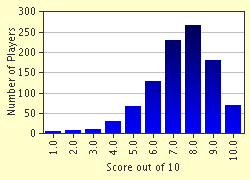Quiz Answer Key and Fun Facts
1. What does the word "parable" mean?
2. Jesus taught "the parable of the sower". Which of the following was not mentioned as a type of ground that the sower's seed fell on?
3. Jesus taught "the parable of the hidden treasure in a field". According to Saint Matthew, what is the first thing that the person who finds this hidden treasure does?
4. Jesus now tells the parable of "the pearl of great price". What does the merchant do when he finds this pearl?
5. Jesus relates "the parable of the mustard seed". How does Jesus describe the mustard seed?
6. Jesus teaches "the parable of seed that grows of itself". Is the seed ever harvested?
7. In the relation of "the parable of the Good Samaritan" what spiritual principle from the following was Jesus confirming?
8. In "the parable of the lost sheep" what does the man do who has a hundred sheep and finds one of them missing?
9. In "the parable of the prodigal son" what does the word "prodigal" mean?
10. In "the parable of the talents" what happens to the servant who (according to his ability) is given one talent (the unit of money at the time) by his Master and goes and buries it safely in the ground until the master's return?
Source: Author
rialto88
This quiz was reviewed by FunTrivia editor
CellarDoor before going online.
Any errors found in FunTrivia content are routinely corrected through our feedback system.

